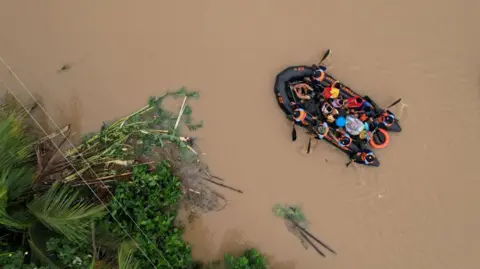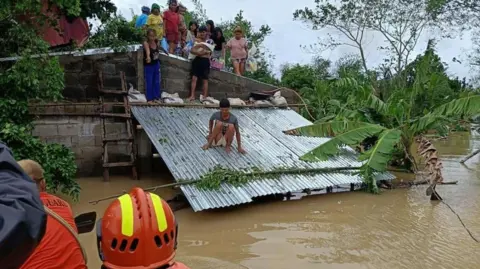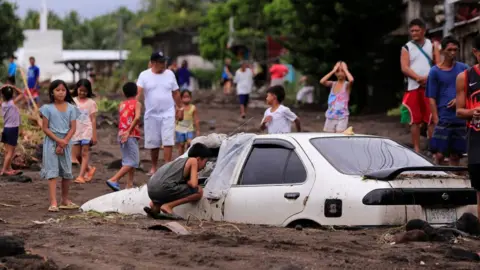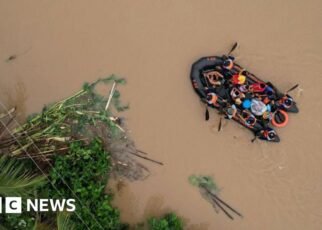[ad_1]
 Getty Images
Getty ImagesA tropical storm has dumped one month’s worth of rains over large swathes of the northern Philippines, leaving more than 20 people dead and forcing 150,000 others to evacuate.
Trami made landfall Thursday on the northeast coast of Luzon, the country’s most populous island, and caused widespread flooding and landslides.
The Bicol peninsula was worst-hit, where floodwaters chased people and their pets to the second storey of their homes.
Typhoons are common in the Philippines at this time of the year, but Trami’s rains were unusually heavy, the state weather bureau told BBC News.
People trapped on their roofs posted photos of their ordeal on social media to appeal for rescue, prompting the coast guard to deploy rubber boats.
“It’s getting dangerous. We’re waiting for rescuers,” Karen Tabagan from the flooded municipality of Bato told AFP News agency.
 EPA
EPAThe rains also triggered volcanic mudslides or lahar in villages surrounding Mount Mayon, an active volcano in Bicol. Photos showed the tyres of cars and the front doors of houses partially buried in dark grey mud.
The storm, known locally as Kristine, had dumped one month’s worth of rain over 24 hours in Bicol, Ana Claren, a forecaster at the state weather bureau in Manila, told BBC News.
The rainfall amount also exceeded what the weather bureau considers “normal” over 30 years of observation, she said.
“The rains were really severe. We did not expect this,” Glenda Bonga, the acting governor of Albay province, told local broadcaster ANC.
The storm, which was packing winds of up to 95 km/h (59 mph), was forecast to leave the country’s north-west coast late Thursday evening.
 Getty Images
Getty ImagesRescuers were also searching for a missing fisherman after a boat sunk in the waters off Bulacan province, west of Manila, the local disaster agency told AFP news agency.
Rescue work has been difficult as the winds were causing a strong current, said Geraldine Martinez, a rescue officer in Bulacan’s Obando municipality.
At least a dozen flights across the country had been cancelled.
Even as it was on its way out of the Philippines, officials have continued to warn of heavy rainfall, flooding, landslides and storm surges.
Another low pressure area off Bicol could intensify into a tropical depression by the end of the week, Ms Claren said.
The Philippines is hit by an average of four typhoons annually, some of them deadly.
However, recent years have seen typhoons with stronger, more destructive winds and heavier rains.
[ad_2]
Source link freeslots dinogame telegram营销




